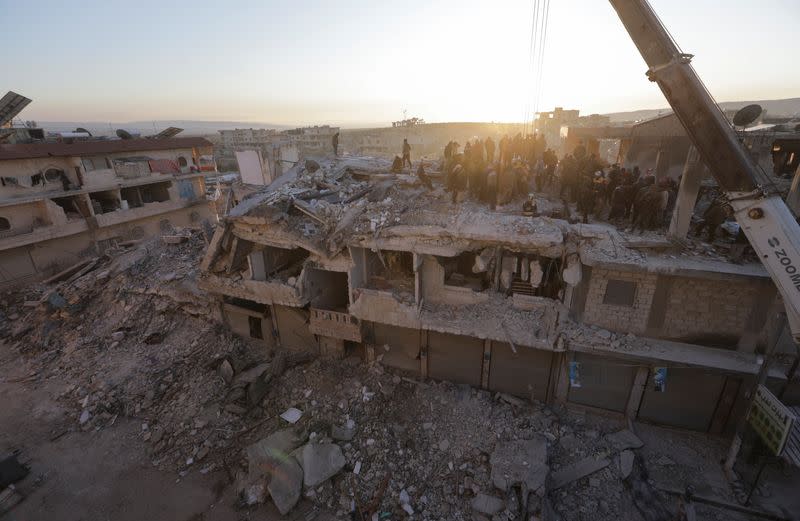U.N. quake aid convoy reaches Syria where 'everything' needed
IDLIB, Syria (Reuters) -The first United Nations convoy carrying emergency aid to a rebel-held area of Syria stricken three days ago by a deadly earthquake crossed from Turkey on Thursday.
The trucks, with materials from jerrycans to blankets, went via the Bab Al Hawa crossing to Idlib city in an area of northwest Syria where 4 million people, many uprooted by civil war, had relied on aid even before Monday's quake.
The disaster has killed more than 17,000 people in Turkey and Syria, leaving hundreds of thousands homeless.
"We need life-saving aid," U.N. envoy to Syria Geir Pedersen told reporters in Geneva.
"It's desperately needed by civilians wherever they are, irrespective of borders and boundaries. We need it urgently through the fastest, most direct and most effective routes. They need more of absolutely everything."
With frustration rising at the slow delivery of aid, Turkish officials said they would open other crossing points into Syria in two days if security was sound.
'TIME RUNNING OUT'
Pedersen called for assurances there would be no political hindrances within Syria, where President Bashar al-Assad has been fighting rebels since 2011.
Rescue workers said the U.N. aid was insufficient, with heavy equipment for search-and-rescue operations still needed in areas where people remained buried under debris.
"The U.N. are not delivering the aid that we are in most need of to help us save lives with time running out," Raed al Saleh, who leads the White Helmets volunteer rescue group in the area, told Reuters.
Volunteers and rescue workers were relying on simple tools and old cranes in towns and cities that have seen whole neighbourhoods wiped out, charities and rescuers said.
Mazen Aloush, a spokesperson on the Syrian side of the border crossing, said six U.N. trucks had passed with medical and relief supplies en route to the neediest people in the area.
(Reporting by Gabrielle Tétrault-Farber in Geneva, Suleiman Al-Khalidi in Amman, Hamuda Hassan in Jerusalem, Abir Al Ahmar in Dubai;Writing by Andrew Cawthorne;Eediting by Nick Macfie)


